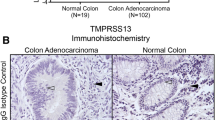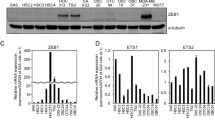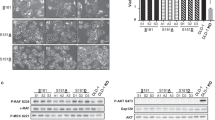Abstract
We have previously shown that the human ETS1 protein (p51-ETS1), when ectopically expressed in colon cancer cell lines, is able to reduce its tumorigenicity without affecting its growth properties. To understand the mechanism of tumor reduction, we have expressed two different forms of ETS1 in colon cancer cell lines. Data presented in this paper indicate that the naturally occurring spliced variant protein, p42-ETS1, lacking the region encoded by ETS1 exon VII, represses the tumorigenicity, while p51-ETS1 reduces the tumorigenicity. Repression of tumorigenicity mediated by p42-ETS1 appears to be caused by its ability to induce apoptosis in epithelial cancer cells. This work can have profound medical significance in that it may open up new insights into the potential role of the p42-ETS1 in the induction of apoptosis in epithelial cell cancers and may provide a rationale for its use for potential gene therapy experiments to initiate cell death in cancer cells.
This is a preview of subscription content, access via your institution
Access options
Subscribe to this journal
Receive 50 print issues and online access
$259.00 per year
only $5.18 per issue
Buy this article
- Purchase on Springer Link
- Instant access to full article PDF
Prices may be subject to local taxes which are calculated during checkout
Similar content being viewed by others
Author information
Authors and Affiliations
Rights and permissions
About this article
Cite this article
Huang, CC., Papas, T. & Bhat, N. A variant form of ETS1 induces apoptosis in human colon cancer cells. Oncogene 15, 851–856 (1997). https://doi.org/10.1038/sj.onc.1201408
Received:
Revised:
Accepted:
Issue Date:
DOI: https://doi.org/10.1038/sj.onc.1201408
Keywords
This article is cited by
-
SP100 expression modulates ETS1 transcriptional activity and inhibits cell invasion
Oncogene (2004)
-
Characterization and functional analysis of the p42Ets-1 variant of the mouse Ets-1 transcription factor
Oncogene (2003)
-
Differential regulation of the response to DNA damage in Ewing's sarcoma cells by ETS1 and EWS/FLI-1
Oncogene (2002)
-
Altered Ets transcription factor activity in prostate tumor cells inhibits anchorage-independent growth, survival, and invasiveness
Oncogene (2000)
-
EAP1/Daxx interacts with ETS1 and represses transcriptional activation of ETS1 target genes
Oncogene (2000)



